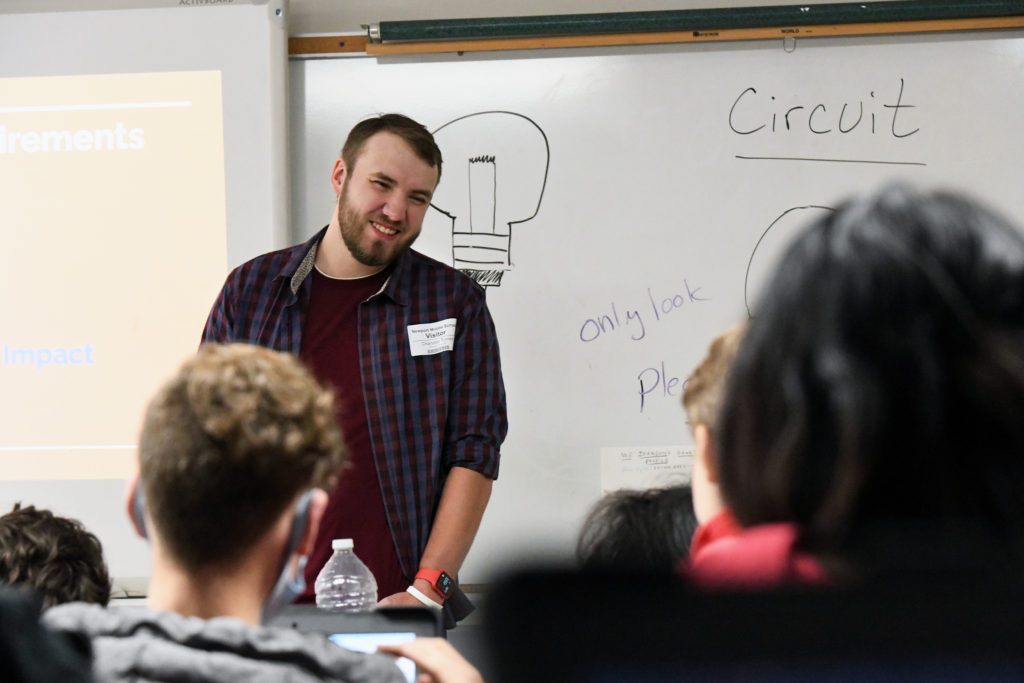
By JORDAN ESSOE/YachatsNews.com
Born and raised in Waldport, Chandler Turner decided he wanted to be a teacher in his final year of high school.
While studying at a community college in Coos Bay, he heard of a new collaboration between the Lincoln County School District and Oregon Coast Community College designed to help residents become local educators.
Turner came home to join the program, working part-time as a classroom assistant, attending OCCC classes and then eventually transferring to Western Oregon University to complete his studies.
He is still a year away from graduating with his degree. But now equipped with an emergency teaching license made available because of the coronavirus pandemic, he is already substitute teaching at local middle and high schools.
“It has cemented my love for teaching,” said Turner. “To be able to dive deeply into subjects that I love, and share that with students.”

The school district and community college are betting that ‘Buy local’ is a philosophy that can also apply to employing teachers. Under the monikers “Grow Your Own,” and “Teach at the Beach,” they developed programs to help foster locals who want to pursue a career in education – and hopefully persuade them to stick around after they’ve completed college.
The effort is only three years old, but it is already showing signs of success.
The main “Teach at the Beach” program provides advisory services and paid assistant teaching work, in multiple cases even for students still in high school. Those students may continue to be employed by the school district through two years of study at OCCC, granting them experience, clarity about their career, connections with future possible employers and colleagues — and the benefit of a paycheck.
This is only one avenue of the program, which has two other main pathways for developing local teachers. The district and college are also helping to train more child-care workers and sponsoring classified employees to go back to school and get licensed without loss of benefits, pay or seniority.
There is an educator shortage in the state of Oregon and across the nation. In Lincoln County there has historically been a large turnover rate of teachers. Reasons behind that include housing affordability, childcare, the coastal climate and, for some, the lack of a social life.
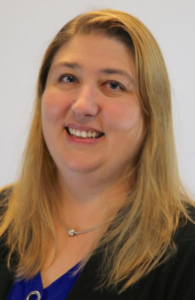
Theresa Harper, an OCCC education instructor and adviser, said many teachers come to Lincoln County thinking it will be fun, but quickly become disenchanted and move on to other jobs in Portland, Eugene, or out of state.
People who grow up here don’t struggle in the same way with the basics of coastal Oregonian living.
“The hope with this program is that we would get people who had generational ties to Lincoln County,” said Harper. “They know where we have resources, where we don’t, and how to work around the gaps in those resources.”
Harper described how people who deeply understand the coastal community have higher expectations of their students, not lower ones. She said that is particularly important in counties such as Lincoln County with higher poverty levels.
While the “Teach at the Beach” program doesn’t have the institutional ability to directly address the problem of affordable housing, it does make the assumption that people with local family resources can often navigate that obstacle more easily.
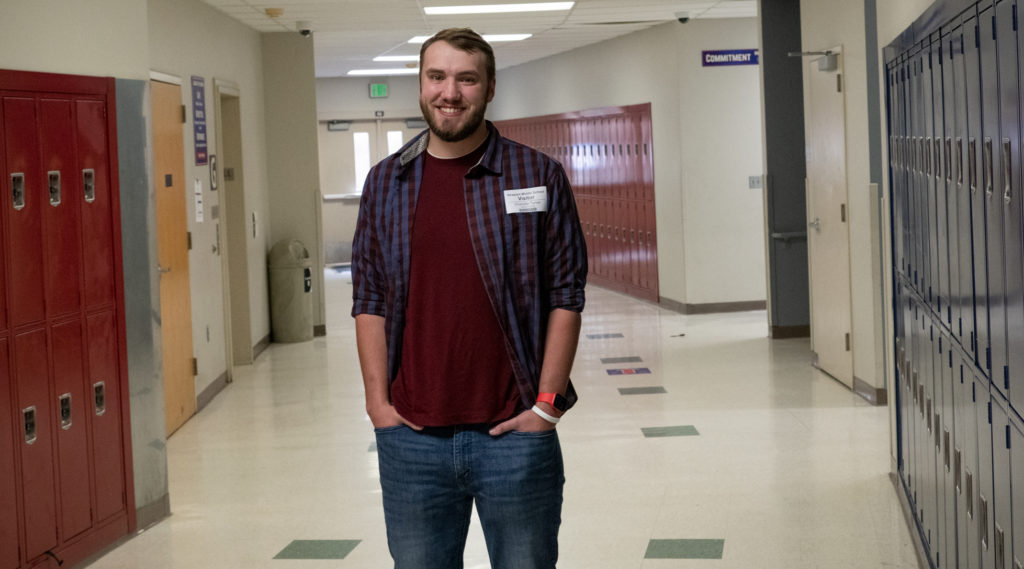
Back home to work, study
It was Turner’s mother, who has worked as a nurse for Lincoln County for decades, who first found out about the “Teach at the Beach” program and urged her son to look into it.
“She wanted me to come home and work with familiar faces,” said Turner.
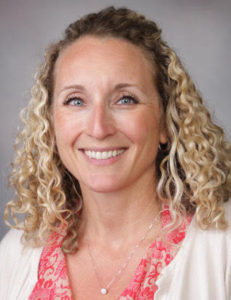
Turner interviewed with LCSD human resources director Tiana Tucker, who said the program could offer him 17.5 hours a week of paid work as a classroom assistant. She explained the institutional relationship with OCCC and the further benefits of attending Western Oregon University two years later to complete undergraduate studies and their teaching licensure program.
Tucker placed him as a Lincoln County classroom assistant in the fall of 2018, the pilot year of the “Teach at the Beach” program.
For the next two years, while he studied at OCCC, he fulfilled a series of three- month placements, always changing to a new school or classroom for each new school term. His concentration is in history, but in order to experience a full palette of teaching styles and curriculum, he was often not assisting in a social studies classroom.
Working with multiple teachers in elementary, middle, and high school settings “really showed me what grade level I wanted to teach at,” said Turner.
He discovered he prefers to teach secondary school, where the students are “old enough that we can really dive deep into a subject area.”
“The more a student understands the career field they’re getting into, the more motivated they are to complete their studies and stay in the profession,” said Dan Lara, OCCC’s vice president of academic affairs. “The types of internship opportunities that Lincoln County School District is offering prospective school teachers is going to be hugely impactful in terms of helping these students understand that, yes – this really is what I want to do.”
Inspired by own teachers

Turner didn’t always know he wanted to become a teacher, but said he was inspired as a senior at Newport High School by a new social studies instructor named Ben Ryan.
“He brought a lot of fresh ideas to the classroom because he was a brand new teacher,” said Turner.
The inspirational spark happened over a series of lessons where Ryan used the Monopoly board game to teach students about contrasting economic systems. First the class played capitalist Monopoly with the standard rules, and then changed to socialist Monopoly where Water Works and the Electric Company were owned by the state. Finally, in communist Monopoly, none of the players could own any property and all the money went directly to the banker, who took half for himself.
The exercise opened Turner’s eyes to the idea that education could be active, creative, and exciting. In retrospect, he can also now see how other educators played a meaningful role in helping to shape his development.
Turner is now 23 and one year away from graduating with a bachelor’s degree from Western Oregon.
In some situations, the school district will continue to employ students as classroom assistants beyond their time at OCCC. That would have have been the case with Turner, but for the Covid pandemic temporarily closing classrooms.
Emergency teaching licenses became available in Oregon for classified workers and students in late 2021. The district sponsored Turner to become licensed in February.
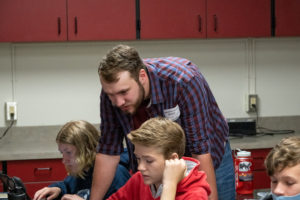
Since then, he has been driving back to Lincoln County from Monmouth every weekend. About every other week he has a substitute teaching job on Friday or Monday.
On those days, if he isn’t already booked, he wakes up at 6 a.m. to check his phone. Sometimes he has no job offers, and sometimes he is able to pick and choose from multiple places that need coverage. With his emergency teaching license, he is eligible to teach at any secondary school in the county.
Most often he has been hired at Newport Middle School, where he has repeatedly substituted for science teacher PJ Collson. Collson had Turner as a student in seventh and eighth grade and later also had him as an assistant teacher. Their relationship exists now in three graduating chapters.
“Chandler is awesome, and he’s really been there for me,” said Collson. “It all comes back around. I put a lot of effort into him as a student, and now he’s able to return the favor. He’s a bright, engaged, kind human being, and I know he’ll make a great teacher.”
Turner describes Collson’s teaching style as being outside the norm in a good way. He says Collson looked for every opportunity to take the class outside to study the natural world directly, instead of just study concepts out of a book.
“He was really hands-on in that way, and I’d like to adopt that into my own teaching style,” said Turner. “Instead of just telling the students, I’d like to show them.”
Turner’s emergency teaching license expires in June, but next year he expects to begin student-teaching at Newport High, working under his role model Ryan.
Turner has been warmly encouraged by administrators, teachers and principals of several local schools to work in Lincoln County full-time once he is completely licensed and employable.
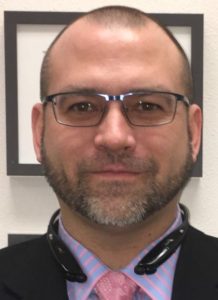
“If we have a job in their field, they are going to be the first person that we look at,” Lara said of candidates who have gone through the “Teach at the Beach” program. “That’s the whole idea of ‘Grow Your Own.’ There is a commitment that they came from us, and we supported them along the way of their educational journey.”
While Tucker said the school district hopes to prepare teachers to work in Lincoln County, “… there’s no obligation for them to do that. We’re happy to support them.”
Tucker said the district is also interested in nurturing future school psychologists, counselors, speech pathologists, special education teachers, education lobbyists, and more bicultural and bilingual educators. Currently, classroom teachers and staff are less bilingual, more white, and more female than the student population.
Turner is grateful for the local program, and all that it has already helped him achieve.
“It’s the best way to see if you want to do this work,” he said. “In the beginning, you get time in the classroom, but not so much time that it’s overwhelming, because you’re not there all day. But you get to dip your toes in the water and see the classroom setting from the opposite perspective – from the teacher’s side. I think this is the best program for students who want to become teachers. If you’re interested, you should definitely go for it.”
- Jordan Essoe is a Waldport-based freelance writer who can be reached at alseajournal@gmail.com



I taught in Lincoln County schools for one year and the problems that cause your teachers to leave has nothing to do with us not being able to handle the challenges that come from living there. The things that cause your teachers to leave is the administrators at your schools, they way they treat employees who are not their “friends”. The parents and other community members who also treat anyone new to the area like they don’t belong and want them gone. I left Lincoln County schools being told I was the worst teacher ever by administrators yet within a year I had received an award in my new district, within three years I was asked to be the lead teacher in my grade level and asked to be on the school leadership committee by admin. Now five years later I have also been appointed to other committees as the representative of our school and am often directly sought-after by my administators for support and other tasks around the building. Your districts issues are not in teacher retention but how your principals treat their staff. Employees do not leave jobs, they leave bad supervisors. Quit blaming the location and look to the real problems in Lincoln County schools.